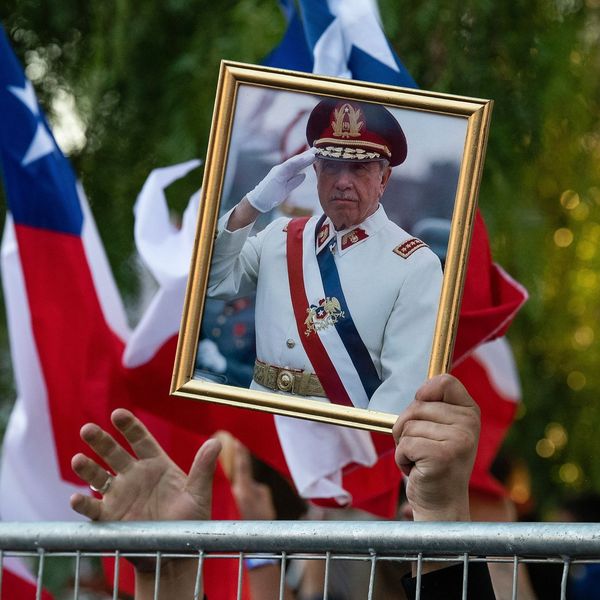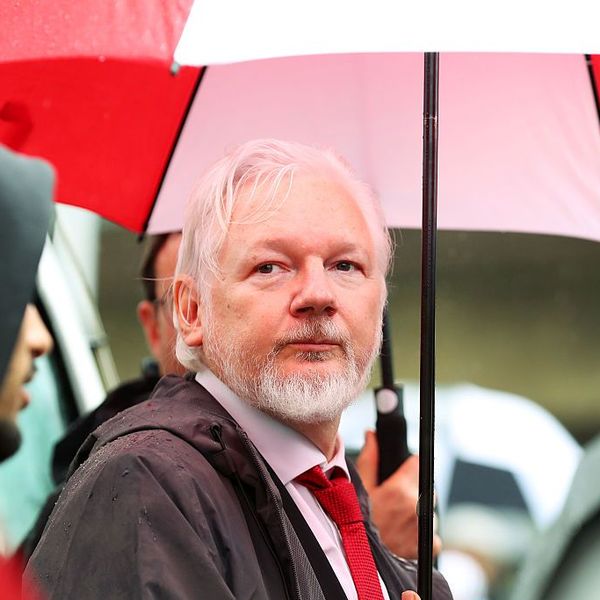Former Argentina President Nestor Kirchner Dies
Contender to succeed his wife, Cristina Fernández, in Argentina's election next year, dies from heart attack
The former Argentinian president, Nestor Kirchner, the current
leader's husband and a contender to succeed her in next year's election,
has died of a heart attack.
Kirchner, 60, was considered President Cristina Fernandez's closest adviser and a major power broker in her government.
He died after being taken to the Formenti de Calafate hospital while suffering a severe heart attack, the presidency said.
"It was a sudden death"Kirchner's doctor, Luis Buonomo, told Reuters.
The
former president, who underwent two arterial procedures earlier this
year, died in the southern city of El Calafate. Fernandez was at his
side when he died, state television said.
The left-leaning Kirchner from the ruling Peronist party was president from 2003 to 2007 and oversaw Argentina's
recovery from a devastating economic crisis. He was famous for his
fiery speeches peppered with leftist rhetoric and outspoken criticism of
political rivals, private companies and the International Monetary
Fund.
The news immediately had great impact in Argentina.
"A
great patriot has died," said Juan Carlos Dante Gullo, a ruling party
congressman, to state TV. "This will leave a huge hole in Argentine
politics. We will have to follow his example. Argentina has lost one of
its greatest men."
The leader of the human rights group
Grandmothers of the Plaza de Mayo, Estela de Carlotto, said Kirchner
"gave his life for his country."
"Our country needed this man so much. He was indispensable," she told radio Continental.
Kirchner,
a likely candidate in next year's presidential elections, was secretary
general of the South American alliance known as Unasur and also served
as a congressman and leader of the Peronist party.
After meeting
his wife at law school in the turbulent 1970s, the couple took turns in
the political limelight. She was a close adviser during his 2003-2007
rule and he was a key economic adviser since she succeeded him in
December 2007.
He was seen as a key contender in next year's
presidential race and his popularity closely tracked approval ratings
for his wife's presidency that rebounded from lows of about 20%
alongside an economic recovery.
In their back-to-back tenures -
criticised by some for side-stepping presidential term limits - Kirchner
and his wife increased state control of the economy, intervening in
financial and grains markets and maintaining price controls that
analysts say have dampened investment in the energy sector.
An Urgent Message From Our Co-Founder
Dear Common Dreams reader, The U.S. is on a fast track to authoritarianism like nothing I've ever seen. Meanwhile, corporate news outlets are utterly capitulating to Trump, twisting their coverage to avoid drawing his ire while lining up to stuff cash in his pockets. That's why I believe that Common Dreams is doing the best and most consequential reporting that we've ever done. Our small but mighty team is a progressive reporting powerhouse, covering the news every day that the corporate media never will. Our mission has always been simple: To inform. To inspire. And to ignite change for the common good. Now here's the key piece that I want all our readers to understand: None of this would be possible without your financial support. That's not just some fundraising cliche. It's the absolute and literal truth. We don't accept corporate advertising and never will. We don't have a paywall because we don't think people should be blocked from critical news based on their ability to pay. Everything we do is funded by the donations of readers like you. Will you donate now to help power the nonprofit, independent reporting of Common Dreams? Thank you for being a vital member of our community. Together, we can keep independent journalism alive when it’s needed most. - Craig Brown, Co-founder |
The former Argentinian president, Nestor Kirchner, the current
leader's husband and a contender to succeed her in next year's election,
has died of a heart attack.
Kirchner, 60, was considered President Cristina Fernandez's closest adviser and a major power broker in her government.
He died after being taken to the Formenti de Calafate hospital while suffering a severe heart attack, the presidency said.
"It was a sudden death"Kirchner's doctor, Luis Buonomo, told Reuters.
The
former president, who underwent two arterial procedures earlier this
year, died in the southern city of El Calafate. Fernandez was at his
side when he died, state television said.
The left-leaning Kirchner from the ruling Peronist party was president from 2003 to 2007 and oversaw Argentina's
recovery from a devastating economic crisis. He was famous for his
fiery speeches peppered with leftist rhetoric and outspoken criticism of
political rivals, private companies and the International Monetary
Fund.
The news immediately had great impact in Argentina.
"A
great patriot has died," said Juan Carlos Dante Gullo, a ruling party
congressman, to state TV. "This will leave a huge hole in Argentine
politics. We will have to follow his example. Argentina has lost one of
its greatest men."
The leader of the human rights group
Grandmothers of the Plaza de Mayo, Estela de Carlotto, said Kirchner
"gave his life for his country."
"Our country needed this man so much. He was indispensable," she told radio Continental.
Kirchner,
a likely candidate in next year's presidential elections, was secretary
general of the South American alliance known as Unasur and also served
as a congressman and leader of the Peronist party.
After meeting
his wife at law school in the turbulent 1970s, the couple took turns in
the political limelight. She was a close adviser during his 2003-2007
rule and he was a key economic adviser since she succeeded him in
December 2007.
He was seen as a key contender in next year's
presidential race and his popularity closely tracked approval ratings
for his wife's presidency that rebounded from lows of about 20%
alongside an economic recovery.
In their back-to-back tenures -
criticised by some for side-stepping presidential term limits - Kirchner
and his wife increased state control of the economy, intervening in
financial and grains markets and maintaining price controls that
analysts say have dampened investment in the energy sector.
The former Argentinian president, Nestor Kirchner, the current
leader's husband and a contender to succeed her in next year's election,
has died of a heart attack.
Kirchner, 60, was considered President Cristina Fernandez's closest adviser and a major power broker in her government.
He died after being taken to the Formenti de Calafate hospital while suffering a severe heart attack, the presidency said.
"It was a sudden death"Kirchner's doctor, Luis Buonomo, told Reuters.
The
former president, who underwent two arterial procedures earlier this
year, died in the southern city of El Calafate. Fernandez was at his
side when he died, state television said.
The left-leaning Kirchner from the ruling Peronist party was president from 2003 to 2007 and oversaw Argentina's
recovery from a devastating economic crisis. He was famous for his
fiery speeches peppered with leftist rhetoric and outspoken criticism of
political rivals, private companies and the International Monetary
Fund.
The news immediately had great impact in Argentina.
"A
great patriot has died," said Juan Carlos Dante Gullo, a ruling party
congressman, to state TV. "This will leave a huge hole in Argentine
politics. We will have to follow his example. Argentina has lost one of
its greatest men."
The leader of the human rights group
Grandmothers of the Plaza de Mayo, Estela de Carlotto, said Kirchner
"gave his life for his country."
"Our country needed this man so much. He was indispensable," she told radio Continental.
Kirchner,
a likely candidate in next year's presidential elections, was secretary
general of the South American alliance known as Unasur and also served
as a congressman and leader of the Peronist party.
After meeting
his wife at law school in the turbulent 1970s, the couple took turns in
the political limelight. She was a close adviser during his 2003-2007
rule and he was a key economic adviser since she succeeded him in
December 2007.
He was seen as a key contender in next year's
presidential race and his popularity closely tracked approval ratings
for his wife's presidency that rebounded from lows of about 20%
alongside an economic recovery.
In their back-to-back tenures -
criticised by some for side-stepping presidential term limits - Kirchner
and his wife increased state control of the economy, intervening in
financial and grains markets and maintaining price controls that
analysts say have dampened investment in the energy sector.

